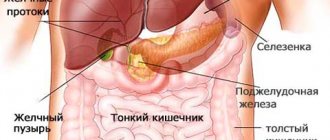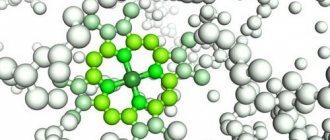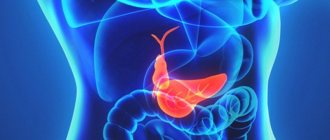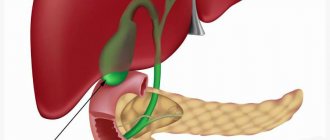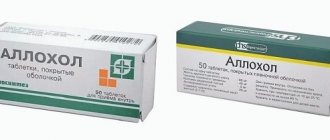In case of stone formation in the gallbladder or stagnation of bile, conservative therapy is used in the form of a course of medications. Some of them are aimed at eliminating the cause of the disease, others relieve pain and relieve unpleasant symptoms, and others are necessary to support neighboring organs and systems of the body. Drug therapy does not always bring the expected result. For a number of reasons, an exacerbation occurs and the patient faces mortal danger, to avoid which emergency surgical intervention is required.
A cholecystectomy is performed, as a result of which the patient's gallbladder is removed. If the gallbladder is removed, it is also necessary to take medications prescribed by a doctor in the form of a regimen. One of the most popular drugs is Allochol, a herbal medicine for the treatment of pathological conditions of the biliary system. But is it possible to take Allohol after removal of the gallbladder?
Participation of the biliary system in the digestive process
The bladder is located under the lower edge of the liver and accumulates bile secretion in its cavity, which is released into the duodenum every time a person eats food. Bile synthesis occurs in the liver, and when moving through the ducts, it breaks down fats in food masses, and also neutralizes the effects of toxins or waste substances that are eliminated by the body through the intestines. Taurocholic and glycocholic acids are components of bile, actively burn fats and promote proper absorption into the walls of the intestinal tract. Bilirubin and part of their bile proteins precipitate. Proper functioning of the release of bile from the bladder helps to destroy excess cholesterol.
Once the biliary storage device is removed, the substance does not have a cavity in which to accumulate, so it is constantly released and irritates the internal surfaces of the intestine. In addition, the concentration of bile secretion and its viscosity decreases, fats are poorly broken down, and the intestinal tract suffers from an excess of undigested food. Allahol is a herbal medicine with complex effects that can be taken both for the treatment of diseases and for their prevention. It is allowed to drink when there is stagnation of bile and after removal of the biliary storage.
Why is a change in the composition of bile dangerous?
Many pathologies of the biliary system change the composition of bile, which affects the general functioning of all systems. The liver also has the same properties. Intensive stone formation begins, and usually the cause is the abuse of fat in the food consumed or damage to the intestinal tract by bacteria, the development of inflammation. In cases of large formations, the lumen of the ducts can be blocked, which can lead to stagnation of bile, the development of jaundice as a consequence of cholestasis, as well as colic with severe pain. Experts indicate that any disturbances in the functioning of the biliary system must be treated comprehensively, using medications, a strict diet and sets of exercises.
Read also: Features of gallbladder histology
Changes in the composition of bile
Allohol in the treatment of the biliary system
When prescribing complex therapy, the doctor selects drugs that stimulate the flow of bile, as well as antibacterial agents. Of the choleretic drugs, the most popular is Allochol, used for polyps or stones in the biliary system, in cases of acute colic or other conditions of the bladder or ducts. All components of this drug are active and affect bile secretions.
Allochol is characterized by choleretic and cholekinetic effects, which is especially effective in cases of intense stone formation. As a choleretic Allochol increases the amount of bile acids in bile, which normalizes its composition. As a cholekinetic drug, it increases the tone of the mucous membranes and muscles, reduces pressure in the biliary system and improves the outflow of bile. In this way, the development of congestion can be prevented. Regular intake of Allochol allows you to normalize liver function and contractile functions of the gallbladder, if cholecystectomy has not been performed. The natural passage of bile accelerates, and the filtration of electrolytes and fluids in the bile ducts increases.
Allochol relieves inflammation and eliminates infections, while the symptoms become less painful and cholesterol does not precipitate. Bile acids prevent cholate formation.
Indications and contraindications for taking Allochol
For stones in the gall bladder, the medication helps remove them, but this effect is only possible if the stones are not large in size. With its help, the body better absorbs vitamin substances if they are prescribed to eliminate pathological processes in the biliary system.
The main indications for taking this choleretic drug are:
- therapy for cholelithiasis;
- prevention of cholestasis;
- the presence of chronic constipation if the muscle tone of the intestinal tract decreases;
- deterioration of motor skills;
- the presence of chronic hepatitis, liver pathology of toxic origin;
- development of cholangitis or cholecystitis;
- inability of the intestines to fully absorb nutrients.
When prescribing a therapy algorithm, it is possible to combine this drug with laxative drugs to prevent difficulties with bowel movements . If vitamin therapy is prescribed at the same time, this remedy helps the beneficial substances be better absorbed by the body. Only the doctor decides in each specific case whether this drug should be prescribed. By using antibacterial agents and antiseptic drugs in parallel, pathological reactions are neutralized in a shorter period of time. For dyskinesia, take these drops and tablets if the doctor deems it appropriate.
Main contraindications for use:
A contraindication to the use of Allochol is exacerbation of hepatitis of various types and forms
- intolerance to the components included in the composition;
- the presence of dystrophic changes in liver tissue;
- presence of obstructive jaundice;
- exacerbation of hepatitis of various types and forms;
- ulcer;
- exacerbation of chronic enterocolitis.
If there are stones in the gall bladder, before treatment with this medicine, a thorough examination should first be carried out, since in the presence of excessively large stones, drug therapy is not carried out.
Features of taking Allochol
In cases where Allochol is prescribed for gallstones, it increases the secretion of bile, which has a beneficial effect on the functioning of the intestinal tract. The main purpose of the drug is to increase the volume of bile synthesized, which is especially important after cholecystectomy. If the patient is diagnosed with cholestasis, then the use of Allochol is prohibited. Before starting any medications, it is necessary to obtain the consent of the attending physician, this is especially important in the case of stones in the biliary system.
Allochol consists of garlic extract, which prevents putrefactive processes, flatulence and fermentation in the intestinal tract. Stinging nettle not only has a choleretic effect, but also relieves inflammation. Activated carbon, present in Allochol, perfectly absorbs all toxic substances and toxins in the gastrointestinal tract, removing them naturally. The plant base of the herbal remedy allows it to be used by pregnant women and during lactation, as well as by children with constant medical supervision. Patients need to undergo regular laboratory tests to ensure the effectiveness of the medication they are taking. An ultrasound may also be necessary.
The benefits of Allochol and its therapeutic effect
The benefits of Allochol and its preventive effect in diseases of the biliary tract are due to the rich composition of this drug, which includes the following active substances:
- dry bile;
- Activated carbon;
- nettle leaves;
- dry garlic extract.
Allohol tablets have a pronounced choleretic and cholekinetic effect. On the one hand, they stimulate intensive bile production, and on the other, they improve its outflow and prevent stagnation.
The benefits of Allochol after cholecystectomy are a proven fact
In the process of normalizing the outflow of bile, liver function is restored. In addition, due to the fact that bile is intensively released from the biliary tract, the risk of cholesterol precipitation is reduced. But it is precisely because of it that stones form in the gallbladder and ducts.
TEST: What is the condition of your liver?
Take this test and find out if you have liver problems.
Start test
If the gallbladder is removed, in the postoperative period many patients may experience the so-called postcholecystectomy syndrome.
In most cases, it manifests itself with the following symptoms:
- sharp pain in the side and right hypochondrium;
- bitter taste in the mouth;
- heartburn;
- feeling of heaviness in the stomach;
- itching of the skin on the palms and soles.
Allochol quickly and effectively eliminates the listed symptoms.
Allochol helps speed up metabolism, normalizes intestinal function and allows you to cope with such a common problem as constipation. And this is exactly what is needed for people who have had or are about to have a diseased organ removed.
When and why is the gallbladder removed?
Sometimes the patient's condition with biliary colic does not improve for a long time. This development of the disease requires emergency surgical intervention when the bile storage is removed. But even in this case, the process of stone formation does not stop, since the cause remains. Now the stones form in the bile ducts and hepatic ducts. As a rule, doctors prescribe a strict diet and a regimen of fractional meals. The digestive system can be supported with enzyme medications.
Read also: When is disability granted after gallbladder removal?
But these measures are not always enough, so the specialist prescribes choleretic drugs to restore the functioning of all organs of the digestive system, as well as increase the flow of bile after cholecystectomy. Such drugs include Allochol, an effective herbal medicine with minimal risks of side effects.
Features of rehabilitation after cholecystectomy
Despite the fact that cholecystectomy is considered a completely safe operation in medical circles, it is associated with the loss of one of the important organs of the human body. And although after cholecystectomy there are no global changes in the body, many patients experience disorders of the digestive system, which are most often manifested by abdominal pain, indigestion, flatulence, nausea and even yellowing of the skin.
As a rule, such symptoms arise as a result of disturbances in the functioning of the sphincter - a special muscle formation that regulates the flow of bile and gastric juice into the duodenum. Malfunction of the sphincter leads to stagnation of bile and the formation of stones in the hepatic and bile ducts. That is why patients after cholecystectomy are recommended not only to follow a diet, but also to take choleretic drugs.
To avoid numerous complications after cholecystectomy, it is necessary to follow a number of measures that are aimed at restoring the functions of the gastrointestinal tract.
Among all the medicines that are used for the treatment and prevention of pathologies of the biliary tract, Allochol deserves special attention. This herbal preparation has long stood the test of time, and its beneficial effects are highly appreciated by representatives of both domestic and foreign medicine. As the main means of drug therapy, Allochol after removal of the gallbladder is prescribed to all patients to normalize the functions of the digestive system and improve bile production.
Allohol after cholecystectomy
Is it possible to drink Allohol without a gallbladder? Yes, after a successful cholecystectomy, Allochol is extremely necessary to stimulate the outflow of bile. It is strictly forbidden to start taking pills on your own; they are prescribed only by the attending doctor during examination during the postoperative period. This drug is included in the traditional rehabilitation scheme for a patient without biliary storage. They drink Allohol for sufficient synthesis of bile and its proper movement through the ducts without a biliary reservoir.
Inna Lavrenko
auto RU
After removing the gallbladder from the body, it is undesirable to suffer from constipation, since internal pressure in the intestines and abdominal cavity increases. The chemical composition of Allochol includes nettle and garlic extract, dry animal bile and charcoal, which helps normalize bowel movements and improve peristalsis in the intestines. Most drugs for the treatment of problems in the biliary system are produced synthetically, so plant-based Allohol is one of the most popular and frequently used drugs. Regular use will improve the patient's condition, eliminating flatulence and fermentation in the intestinal cavity, and will help the proper functioning of all digestive organs.
Features of taking Allochol
Allohol as a choleretic agent is used only after meals. In cases where the drug is prescribed as therapy for a chronic disease, the course lasts about a month on the recommendation of doctors. The drug is taken three times a day, two tablets per dose. After 5 days of regular use, you feel better, pain and the appearance of possible unpleasant symptoms decrease.
After laparoscopy and during exacerbations of stone disease in the chronic stage, the use of Allochol is extended to two months. It is allowed to change the dosage regimen by taking one tablet once or twice during the day. It is necessary to read the instructions supplied with the drug by the manufacturer. The course can be repeated after a break of three months. If you drink too much Allochol, you will experience itchy skin, stomach upset in the form of diarrhea, as well as rashes and dermatitis.
Read also: How to take Karsil for gallstones?
It is forbidden to drink alcohol with Allochol, since alcohol of any strength increases the production of gastric juice and provokes spasms in the bile ducts. The patient experiences these symptoms as diarrhea and severe pain in the right side of the upper abdomen under the ribs. It is also prohibited to consume cholestyramines, aluminum hydroxides, and cholestipol. These substances interact with Allochol and reduce its effectiveness. If there are infections in the bile ducts or in the liver, it is allowed to take antiseptics, as well as chemotherapy drugs and antibiotics, along with Allochol. For inflammatory foci, all these medications work together much more effectively.
Who is recommended to take Allochol?
The drug improves the absorption of vitamins A, D, E by the intestinal walls. Therefore, these medications are usually taken in combination. It is recommended to use Allochol together with laxative and choleretic medications to prevent constipation. Allochol therapy is combined with antibiotic and antiseptic drugs. At the same time, therapeutic practice against stones shows rapid suppression of inflammation of infectious origin. In this regard, the drug is prescribed in the treatment of secretion stagnation for various reasons.
The medicine is prescribed to patients diagnosed with:
- housing and communal services;
- hepatocholecystitis;
- chronic constipation caused by weakness of muscle tone in the intestines;
- decreased motility of the bladder walls, bile ducts;
- chronic hepatitis;
- cholangitis, cholecystitis.
All prescriptions must be confirmed by diagnostic results, which the doctor relies on when making a diagnosis and explains how to take the drug against stones.
But in many situations there are contraindications to the use of Allochol.
This list includes those diagnosed with:
- dystrophy of the liver tissue;
- jaundice of mechanical etiology;
- acute hepatitis;
- peptic ulcer;
- acute enterocolitis;
- individual non-perception of the constituent elements of the drug.
With such diagnoses, Allochol is not allowed to be taken.
Contraindications to the course of treatment with Allochol
Before starting a course of Allochol, you need to make sure there are no possible contraindications. All information is placed in the annotation attached to the drug. It is strictly forbidden to use the medicine if you are intolerant to any of its components, as well as with dystrophic or ulcerative changes in the liver, or jaundice.
Doctors do not recommend using Allochol for patients with acute hepatitis, as well as for stone disease with stones larger than 10 mm. Large stones tend to get stuck when moving in the lumens of the bile ducts, causing stagnation of bile. After an exacerbation of cholecystitis, taking choleretic drugs is also prohibited; you must wait about a week before starting a diet and taking Allochol.
YouTube responded with an error: The request cannot be completed because you have exceeded your quota.


